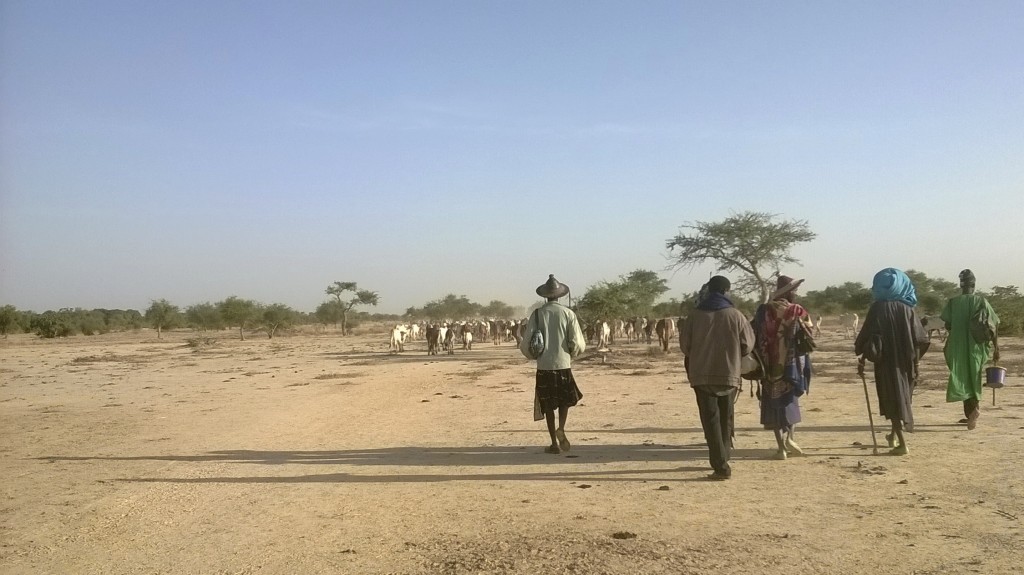To say the least, Anna Badkhen is a wanderer.
From the edges of Mexico to the villages of war-torn Afghanistan, the West Philly-based Badkhen has roamed the earth, searching for those societies in extremis—those people living in the farthest reaches. It’s often there, in those outlying regions, where she finds a fuller picture of life: of communities surviving in areas unheeded by the contemporary world.
As a journalist and writer by trade, Badkhen has written four books and countless articles about people in extremis, translating her experiences and their realities into exceptionally woven and affected stories. And now, Badkhen has launched an Indiegogo campaign to help fund her latest book, Walking with Abel (Riverhead Books), which will publish next year.
Donations to Badkhen’s campaign, which closes on March 8, will help fund the completion of the Walking with Abel manuscript. The book tells a nomadic Fulani family’s story of “survival, perseverance and adaptation” living in the Sahel region of Mali in Western Africa, where Badkhen spent much of 2013. Ultimately, says her campaign site, the fundraiser will “make truly communal the book that explores the mega-narrative of all of our human migrations, our ancestral restlessness, our shared hejiras.”
When West Philly Local asked Badkhen about what made this trip truly unique, she replied:
“‘Where are you from?’ My hosts in an Afghan village would ask, my hosts on a farm in Western Iraq, in the velvet mountains of Indian Kashmir, in the snakepit dugouts of Azeri refugee camps. I had grown up in a country that no longer existed, in a city that since had changed its name: Leningrad, USSR. I had moved away, and moved again, and again. My point of departure was never the same: Moscow, Massachusetts, Philadelphia. It made for relatively effortless travel. It made for uncomfortable silences, odd hesitations.
The Fulani ‘are regarded everywhere as ‘the other’ or ‘the stranger,’ writes the Dutch anthropologist Mirjam De Bruijn. ‘They are always the people who come from far away.’ They were hereditary outsiders who appropriated all the space their cows required at any given time but never more than that. The Fulani never asked me where my home was.”
–Annamarya Scaccia








February 6th, 2014 at 6:42 pm
This crowd source crap has gone too far. I am sick of seeing able people beg. World travel is a luxury. Anyone who gives to such a “cause” should really do some soul seeking, especially given the poverty in our own neighborhood. This kind of advertisement has no place on this news source. I am disgusted.
February 7th, 2014 at 9:59 am
If you are disgusted, then don’t contribute money. There are other people who find that learning about a people, whom they will never happen to have the opportunity to visit and to whom little to nothing has been written, is something of value to us individually and as a culture. There are some of us who also believe that an inspired person’s ability to bring this to the rest of us should not be limited by the religion of capitalism.
February 15th, 2014 at 7:15 am
Does Sciaccia really mean to say that Badkhens’ stories are affected? That would not be good —
affected, defined:
a : having or showing an attitude or mode of behavior that is not natural or genuinely felt : given to or marked by affectation
b : assumed artificially or falsely : pretended
“. . . Badkhen has written four books and countless articles about people in extremis, translating her experiences and their realities into exceptionally woven and affected stories.”
February 15th, 2014 at 7:26 am
Jack, yes, I really did mean to use “affected”. Another definition for the word is “emotionally stirred or moved”; “deeply moving” (http://www.thefreedictionary.com/_/dict.aspx?rd=1&word=affected). I used “affected” in the context of this definition, but thank you for inquiring to make sure.
-Annamarya Scaccia
February 15th, 2014 at 9:18 pm
Annamarya, the word you want is “affecting”, not “affected”. When someone reads an affectING (or stirrING) story, they are affectED (or stirrED). Similarly for “excitING/ED”, “interestING/ED”, and any other applicable verb.
The first definition you quote, “emotionally stirrED or movED”, is on the page you link to. The second, “deeply movING”, is not, though you will find “deeply movED” there, twice.
—Mark Mandel
February 15th, 2014 at 11:25 pm
Mark and Jack are right on this one. Annamarya, using your own defense, how can a story itself be “emotionally stirred”?